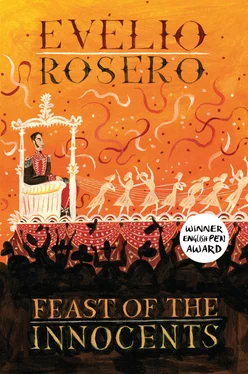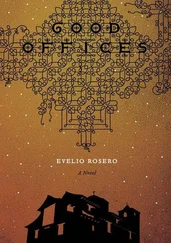“This is sad, Doctor,” he heard her say, “Arcángel won’t come home tonight, he was seen very drunk at his new finca in Sandoná. Why did you sell it to him? He won’t come home to sleep and I won’t know what to do.”
Neither will I, thought the doctor.
“Your wife and daughters aren’t here,” the pious woman continued, as if remarking on the day of the week. “They went to see street bands in El Tambo, with the servant and all. They told me they’d be back tomorrow, for Black Day.”
Only then did Alcira Sarasti notice: he’s completely drunk — and she wanted to go up the next street, run across the road to the other pavement, “all the men here go about drunk, they drink for one reason, they drink for another, Holy Mother of Mercy, Pasto is still sick and there’s no cure,” but it was already too late: the doctor stretched out a hand as if in greeting and pulled her to him hard and kissed her much harder still, crushing her. Then he just said “follow me” in her ear, and she did.
More than drunk, immoral — the pious woman thought, hearing him laugh; the doctor struggled to open the door, but when he managed it she went straight in, rather startled.
So they were going to kill him, the doctor remembered, and froze; he could remember it now he was inside, in the heart of his own home: some murderer might be lurking behind the walls. That fact shook him, waking him up, but the thought soon vanished; Primavera’s absence grew more noticeable; so Primavera wasn’t around, oh, how much her presence mattered to him — in spite of everything, he thought.
But he forgot about Primavera when he sensed, behind him, the perfumed shadow of the pious Sarasti silently encouraging him. She was a shadow aflame, burning the air, a red-hot apparition. He forgot his forthcoming death, forgot for ever that they were going to kill him and, amazed, observed the pious Sarasti in the pitch-black night: yes, he confirmed, the heat emanated from her, physically. He saw it as a sort of orange glow around her pale face. She had pressed her palms together as though praying, and her lips were moving in prayer, no doubt about it. What was she asking for? Strength? Protection? Which saint was she putting her faith in? The doctor saw light separate itself from the line of her stomach, another mouth, sinuous and floating. Or am I raving? The devout Sarasti was a living torch, levitating. “Not even modern science could explain you,” he said. “What did you say?” the pious woman asked, but he was already dragging her by the hand, stumbling along. On the stairs, heading for the bed, the doctor tripped time and again, but the pious woman’s hand appeared, to save him.
“Let us rest,” she said, like a supplication. What a hallowed voice. She was praying. In the middle of the bed the doctor thought he could smell incense. She — the mystical voice — went on with utter sincerity: “I haven’t experienced such excitement since my first communion; this is the first time I’ve been with a man other than my husband, and, I promise you, it is more terrible than the first time I was with him.”
Doctor Proceso was struggling to pay attention to her, he did not know what had gone on or how, he did not remember. Before reality should hit him in the face it would be better to find another bottle of aguardiente , or reality will be worse, he thought. Was I rude with her in this bed? I threatened to nibble her biscuit, that’s what he’d called it, and he’d nibbled away until he heard her cry out, and now he felt the devout woman’s leg on top of his, rubbing it gratefully, he heard her Mass-time voice, her voice of the Elevation. Dawn was not yet breaking in the bedroom: Black Day was only lighting up the cracks in the window frames very slightly. One of the windows gave onto the garden, the other onto the street: the doctor did not know against which of the two Primavera Pinzón’s face and silhouette were outlined.
Impossible, he thought.
“What a pair of rabbits,” they heard. “You’ve been magnificent.”
Yes, it was Primavera Pinzón’s voice — like diamond because it seemed to cut through them in the gloom; a very different voice to Alcira Sarasti’s sung Mass, a deep voice but deeply feminine, and in spite of that, a roar.
Neither of the two moved; they just listened, overwhelmed.
“I never imagined it,” they heard, “such acrobatics, Doctor Donkey, what rubber doll bendiness, my God, what jumping, what jerking, what appetites, why did you never give me a bit of that?”
“Primavera,” the doctor said.
“What?”
“We can talk later.”
“Really? Painted black?” she asked.
Then:
“And in my own bed, with such a paragon of virtue: little Saint Alcira Sarasti.”
The pious woman was heard to sob.
The doctor sat on the edge of the bed. In the incipient semi-dark he was casting about for Alcira Sarasti’s clothes.
“There are no clothes,” Primavera announced emphatically. “I threw them into the street.”
Sarasti’s exclamation of disbelief was audible.
“I threw out yours and your saint’s,” Primavera said.
The doctor wanted to look into her eyes: he made out her face with difficulty. Full of perversity, a woman possessed, he thought. And, nevertheless, inexplicably, he felt like laughing.
Primavera took a step towards him.
“If that Furibundo finds out,” she said, “he’ll leave no-one alive; aren’t you worried? Are you very brave or very drunk?”
The voices of merrymakers leapt up from the street, quarrelsome cries. A rocket burst in the sky, its radiance lighting the room blue; the doctor discovered it was true: there was no clothing anywhere; bringing it in from the street would mean getting past the formidable obstacle of Primavera, in her white dressing gown — happy or unhappy?
“Now,” the doctor said, getting up, “you’ll have to lend her a dress, so she can leave.”
Another sob from Sarasti.
Doctor Justo Pastor Proceso López, naked as found, and not trying to cover himself, went to the wide-open window. He leaned out and saw, by the light of the street lamps, Alcira Sarasti’s clothes and his own scattered about; he even made out their shoes, here, there, upside down, on their sides, everything squalid and twisted like when there’s a traffic accident, he thought, with fatalities.
He went up to Primavera, took her by the arm and, without effort, with just a hint of his anger, put her from the room. He closed the door.
“It doesn’t end here,” Primavera shouted from the other side.
Hearing her shout, the doctor realized she was drunk. He wondered whether his daughters were in the house, listening to it all. Furibundo Pita’s wife was standing, waiting for him, covering her breasts with her hands.
“Has she really thrown out my clothes?” she asked in a thin voice.
“She may well have,” the doctor said. “Pity she didn’t throw herself out.”
And he flung open the doors to the bedroom wardrobe.
“And dawn’s already broken,” the pious Sarasti moaned. And now she covered herself with the sheet, she was a frightened ghost. The doctor chose any old dress from a hanger.
“Not even my shoes are here,” Alcira Sarasti said.
In her surprise, the sheet slipped off her body and she did not notice: her eyes were scanning the whole carpet. She knelt down and groped about under the bed; she did not care about bending over like a spectacle: the doctor positively applauded the fact.
“Put this on,” he said, handing her the dress. “And don’t worry, I’ll come downstairs with you.”
“What will they say at home?” the pious woman sobbed, “what will the maids think when they see me turn up in a different dress, and without shoes?”
Читать дальше












